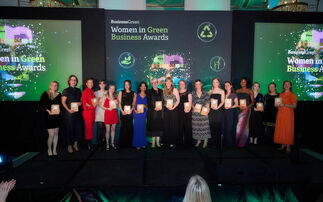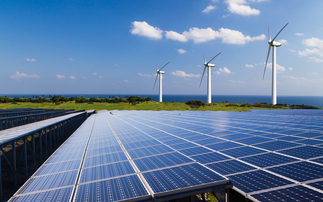Features editor Cecilia Keating's full speech to the inaugural Women in Green Business awards
Good evening everyone, I am delighted to welcome you the inaugural Women in Green Business Awards. The first awards to celebrate the trail-blazing and inspiring work women are doing right across the UK's green economy.
From boardrooms to research vessels, from heat networks to hydrogen labs, from comms agencies to the corridors of Westminster - women are making a difference to the green economy. Just like in all previous industrial revolutions, women are right at the heart of this green industrial revolution. Only this time, we are going to get our full share of the credit.
And what better place to host these awards than here in the Grand Connaught Rooms. For more than a century, the building on this site was a tavern for the Freemasons. An organisation that has a somewhat patchy track record when it comes to inclusion of women in its meetings and spaces.
The reason I say patchy is because apparently there are two women's freemasons lodges in the UK, should you be so inclined.
Incidentally, the tavern was also where the Football Association (FA) was founded in 1861. An organisation which banned women and girls from its pitches until the 1970s. It didn't publish a plan for developing an elite-level women's sport until 1997.
The FA said football was not suitable for women and needed to be discouraged. It could not have been more wrong. It turns out we needed women to win England its first major international football trophy in 56 years.
So, it is brilliant to be gathered here today to reclaim the space from the patriarchy and celebrate the many achievements of the brilliant women working across the green economy. Because tonight is first and foremost a celebration of our finalists, and the work you do.
But it is also a chance to take stock of where the sector has got to in terms of women's representation and participation, and where it needs to go next.
In discussions about the green economy, the topic of a just transition comes up a lot. There is a huge amount of justified concern about the future of oil and gas workers in the North Sea and the steelworkers in Wales and Scunthorpe. The government must come forward with a just transition strategy that works for carbon intensive industries and workers right across the country.
But there is another aspect of the just transition that isn't given nearly enough attention by the media and politicians. And that is making sure the decarbonisation of the British economy tackles, rather than exacerbates, inequalities in the UK's workforce.
I don't need to tell this audience how the low-carbon economy requires the creation of hundreds of thousands of jobs. From heat pump installers and carbon accountants to EV technicians and conservationists.
Much of the growth is expected in STEM fields and manual trades. But these are sectors where women and other disadvantaged groups have historically been underrepresented.
Women make up just 24 per cent of the overall STEM workforce. Less than 16 per cent of engineers are women. They make up less than 26 per cent of the manufacturing workforce and 15 per cent of the construction workforce. Women are also seriously underrepresented in the energy sector, where they are estimated to earn 15 per cent less on average than men.
According to BCG, just a quarter of green jobs around the world by 2030 will be held by women if currently workforce trends persist.
And at a time when investment in climate solutions is paramount, the majority of investment decisions are made by men. There are more funds in the UK run by men called 'David' than there are by women.
I've got nothing against the ‘Davids'. I'm sure some of them are lovely. Some, probably not all.
But this is a palpably absurd and unjust situation. And it means the UK and its net zero transition is failing to make full use of the huge talent at its disposal.
These worrying figures come against a backdrop of an intensifying climate crisis that disproportionately impacts women and girls. Rising temperatures, extreme weather, energy insecurity, and food and resource scarcity are all felt more acutely by women.
When they signed up to the Paris Agreement, governments recognised that increasing women's participation in decision-making would be essential to achieving climate justice. Nearly 10 years later, the UK's green economy is failing this test.
Which is why the work you do is so important. Not only do you deserve plaudits for your work funding, developing, and marketing the critical solutions that could put the world on a more sustainable path. But you are blazing a trail for other women to follow as they seek inspiration for their own careers. Many of you are proactively changing company policies or developing mentorship programmes designed to break down barriers that women and other underrepresented groups face in the workplace. Fighting entrenched ways of doing business at the same time as transforming the fossil fuel economy is difficult work, but it could hardly be more important.
Because breaking down the barriers women face in the workplace is not only critical from a social justice perspective, it matters for businesses too. Countless studies have highlighted how companies benefit from diverse perspectives.
Plus there is the UK's looming green skills shortage to overcome. What hope does the UK have of bridging the green skills gap if low-carbon industries continue to put barriers in the path of half the population?
The good news is that some progress is being made - in large part because of your efforts. Many of the UK's most influential green business groups are fronted by women. Plenty of the most inspiring sustainability executives are women. Perhaps it's no surprise that Mattel launched Chief Sustainability Officer Barbie a couple years ago. I want to see wind turbine engineer Barbie next.
BusinessGreen launched these awards because they are entirely in keeping with our mission to celebrate, to showcase, and to inspire the best of the green economy. To provide the information and the networks that help accelerate the transition to a net zero emission economy that is happier, healthier, and more prosperous for all.
The many nominations and entries to the inaugural Women in Green Business awards are proof in themselves of the role women are playing in growing the UK's green economy. We were inundated with entries. If you made it to the shortlist - you deserve huge congratulations. The quality of entries was seriously high. Whittling down hundreds of nominations and entries to the finalists in the room today was an immensely difficult task.
A big thank you also to our sponsors - Balfour Beatty, Barratt Developments and Hitachi Energy. Without your support this evening would not have been possible. Thank you to the team for all the work that goes into making these awards happen and in keeping BusinessGreen up to date with the latest news and analysis each and every day.
And thank you to all the finalists for entering these awards and joining us this evening. If you don't win, remember there is always next year.
But most of all, thank you for the work you do. This evening is testament to how your work is not only delivering results for your team, company and sector. But it is contributing to a national effort to establish a more sustainable economy for all - an economy where women are properly represented and respected.
Thank you also to all the judges, who had the hugely challenging task of selecting the deserved winners and highly commended entries. And finally thank you once again to all of you for supporting these awards and for the genuinely inspirational work that you do.
There are over 360 people here this evening. We hope you enjoy the chance to connect with so many brilliant friends and colleagues. And if anyone wants to plot how to overthrow any male-dominated institutions, starting with the Masons next door - I'm on table seven.









